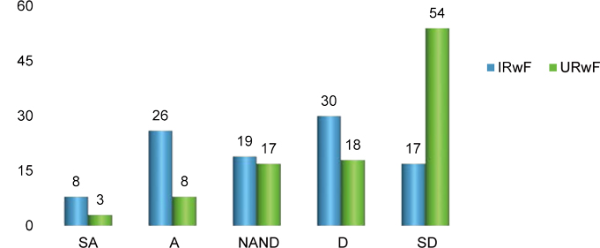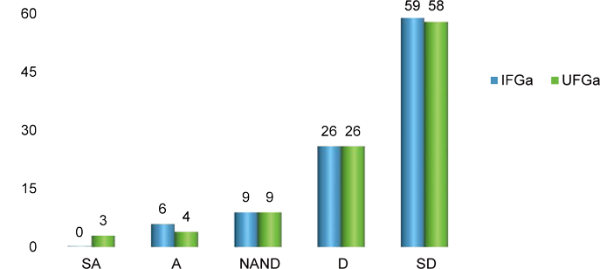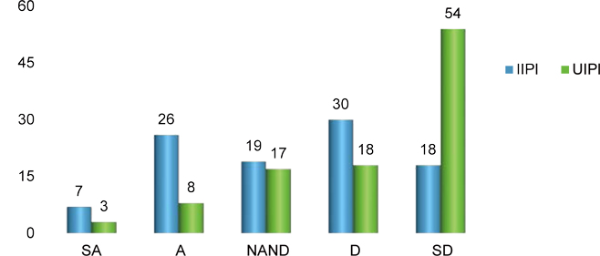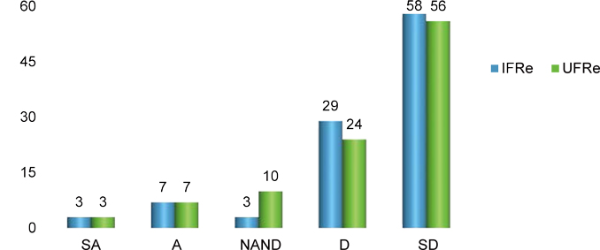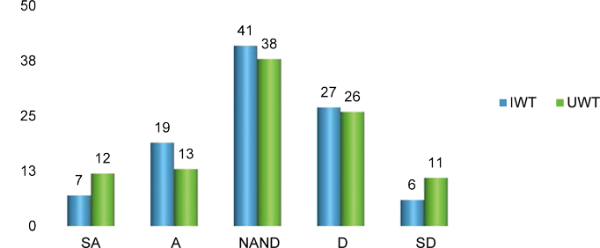ISSN : 2287-9099
Facebook: Hate it or Love it, But Can You Ignore it? A Comparative Study of US and India

Daniel Okunbor (College of Arts and Sciences Fayetteville State University Fayetteville)

Abstract
Facebook has been a part of our lives for the last decade. For a company started in 2004 to have penetrated the lives of people across the globe is commendable. The perpetuation of Facebook has led to a phenomena called Facebook Addiction Disorder. Companies are using Facebook to promote their business and people are using it to promote themselves, in addition to staying connected. In this paper, an effort is made to study respondents from India and the United States of America in order to gauge their dependence on Facebook, and a comparative view of it is presented.
- keywords
- Facebook, FAD, Facebook Addiction Disorder, Social Networking
1. INTRODUCTION
Facebook has been gaining ground since its inception in 2004. In less than a decade, it has become synonymous with the term Social Networking. The buzz around it has increased in the recent past in India, which has the potential to provide Facebook with a stronger user base. India has huge untapped potential for Facebook. The initiatives by the government of India, including the Digital India drive has further strengthened Facebook’s interest in India, with its CEO Mark Zuckerberg visiting India twice in around a year. Indian Prime Minister Narendra Modi’s visit to Facebook headquarters has further strengthened the already sturdy growth of Facebook. The prime minister’s visit implies that being on social media isn’t a matter of choice; the sooner you start taking benefit from it, the better the advantage you will have.
With a strong hold in the US and building up in India, there is a consensus on its advantages, especially the ease with which users can “connect,” irrespective of the geographical boundaries.
The team at Facebook has been working incessantly on changing and improving the experience of its customers. Zuckerberg’s Facebook has been anything but static since its inception, and the competitors that were complacent like Orkut and Google+ have lost ground. They are either abandoned or are not able to compete. Facebook studies its customers to offer them features, similarly introducing its “like” button, its click to “buy,” emojis, and so on. The customized offers it makes raises the question of privacy in the minds of users, again with Facebook making all its efforts to issue statements and figure out ways to address privacy issues.
Is there a perpetual need to study everything that Facebook does, or isn’t there? This question can best be answered through this paper.
Social networking, especially Facebook, has become an imminent part of life and discussions around it have grown, the flipside being that the dependence of people on Facebook has grown, at a fast pace. There’s a thin line between dependence and addiction, and this line is very easy to cross. Various psychologists and researchers in the field have established the symptoms and effects excessive usage can have on users once they become addicted. The symptoms have been defined for research based on the studies by the psychologists. This paper tries to study various aspects of its usage, by studying the respondents through a questionnaire and then comparing respondents from India and the United States, in order to decipher the usage along with the differences, if any, and then comparing them to yield results for us to further investigate.
2. REVIEW OF LITERATURE
In this section a review of articles and studies related to Facebook’s focus on India, and on Facebook Addiction Disorder and various aspects related to it, has been considered. The articles have been quoted and studied to analyze trends, and a review of empirical studies has been undertaken to observe which areas have been explored, and which need further investigation. This was done in order to formulate objectives and undertake productive research. The review has also been undertaken to earmark problem areas related to excess Facebook usage. Besides, these studies will provide insight into the various efforts directed towards better understanding of the complexities involved.
Facebook has been very positive about its Indian presence and has been focusing on India since the Digital India initiative was launched. Mark Zuckerberg visited India in 2014 and met Prime Minister Modi to discuss various aspects of collaboration between the two. In the article “Facebook’s Mark Zuckerberg latest tech CEO to visit India” by Guynn (2014), she shares all that had been planned for the Indian focus. She also discusses Facebook’s Chief Operating Officer Sheryl Sandberg visit to India, Facebook’s second largest market. She also met with Modi, who used social media during his election campaign and also is using it in governance.
In the article “Facebook in India: Can Mark Zuckerberg’s plan really help the poor?” by Suhay (2015), the controversial internet.org site is discussed in detail. Zuckerberg emphasized that free Internet should be a basic right, whereas some sections of people see an underlying marketing gimmick for Facebook rather than a philanthropic one.
As a result of the opposition Facebook is facing from many sections including e-commerce giants, in their study “Facebook addiction - New psychological scale,” Andreassen et al. (2012) show that
• Younger people are more at risk of developing Facebook addiction as compared to older ones
• Anxious and socially insecure people use Facebook more that those who are not, since they find it convenient to communicate via social media as compared to face-to-face
• Organized and ambitious people tend to stay away from addictive use; rather, they tend to use it for work
• Women are more at risk of developing Facebook Addiction Disorder (FAD) due to its social nature.
The study “Facebook addiction: Factors influencing an individual’s addiction,” by Sherman (2011) suggests that although Internet addiction has been studied, social networking addiction has not been researched. The study investigates how factors such as personality, gender, procrastination, boredom, and one’s values may affect amount of time spent on Facebook. It further concludes that users are either overly possessive about their usage thereof or not. The research conducted was a combination of qualitative and quantitative techniques, using scholarly articles that focused on personality types and Internet addiction. Based on the results from the qualitative study, a quantitative survey instrument was devised, which includes Likert-style statements that test personality type, values, boredom, and procrastination.
Psychologist Dr. Michael Fenichel (2010) describes Facebook Addiction Disorder (FAD) as a situation in which Facebook usage “overtakes” daily activities like waking up, getting dressed, using a telephone, or email checking. According to Joanna Lipari (as cited in Fenichel, 2010), a clinical psychologist at UCLA, some signs of Facebook addiction are:
i) Losing sleep over Facebook; staying logged in throughout the night and eventually becoming too tired for the next day;
ii) As a bench mark, spending one hour or more on Facebook is too much;
iii) Being obsessed with exes who reconnect on Facebook;
iv) Ignoring work for Facebook;
v) The thought of getting off Facebook leaving the user in cold sweat.
Shaw (2013), in the article “Status update: Facebook Addiction Disorder,” opines that a user is suffering from Facebook Addiction Disorder (FAD), a disease referred to by psychologists, if he/she has more online friends than real life friendships; also, if users check Facebook more than five times a day (spending hours updating their status), or if checking their Facebook account is the first thing that they do in the morning.
The excuses cited by Facebook addicts have included:
i) The urge of human interaction and the ease of it through Facebook/Twitter;
ii) Getting a message on Facebook/Twitter is exciting since it feels like someone is interested in “me.”
To check this urge to be on Facebook pages, a web application can be used which shuts off the computer after the user has spent a pre-determined amount of time.
Ellison, Steinfield, and Lampe (2007), in their study “The Benefits of Facebook ‘friends’: Social capital and college students’ use of online social network sites,” provide scale items to judge addiction of social networks, viz.,
i. Facebook is a part of my everyday activities
ii. I am proud to tell people, I am on Facebook
iii. Facebook has become a part of my daily routine
iv. I feel out of touch when I haven’t logged onto Facebook for a while
v. I feel I am a part of the Facebook community
vi. I would be sorry if Facebook shut down
vii. Approximately how many Facebook friends do you have?
viii. In the past week, on average, how much time per day have you spent actively using Facebook?
Also, Agyemang (2009), in his article, “Infected with Facebook Addiction Disorder?,” refers to a study by Cambridge University suggesting an argument contrary to the belief that Facebook disrupts social life. It was asserted that it aids people to be more sociable, giving people more choice as to how and with whom they conduct their relationships.
Haisha (2011), in her article “Is your Facebook addiction a sign of loneliness?”, discusses a unique aspect of Facebook addiction which differentiates it from other types of addictions. Unlike addictions to drugs, alcohol, and sex, where guilt is a major factor, Facebook addicts feel that they have reasons to be addicted, since they claim to be doing business. Some are self-employed professionals looking for clients, some are job seekers trying to network for a new job, and some are corporate employees trying to extending their company’s message. Their time on Facebook is actually escapism disguised as working. Also, most of these people are addicted to their past—reconnecting with their friends, old classmates, former lovers, and so on.
In other research on social networks, Yang and Tang (2003) focused on students’ performance in an online course offered at the National Cheng-Chi University in Taiwan. They found that social networks that serve advising roles have a positive impact on students’ performance and that networks that are adversarial have a negative impact.
The review of the available literature reveals that studies have included various aspects of Social Networking Addiction (with special reference to Facebook) including its symptoms; positives of usage (as well as negatives); and the implications and impact of Social Networking Addiction. Among the studies listed here are also included the professional opinions of those psychiatrists and psychologists regarding the influx of Facebook Addiction Disorder (FAD) cases.
3. PURPOSES AND METHODOLOGY OF THE STUDY
This research study will investigate the Facebook usage of respondents. The focus will be on how often people use this tool to converse with or keep current with their friends’ social or personal lives. The significance of the study is to examine the impact of social networking on its users and the merits and demerits of Facebook usage, particularly the aspects that pertain to dysfunctional behaviors.
Facebook is growing bigger and worldwide, and there’s a need to study its impact. Research questions include:
• What is the threshold for Facebook usage to be classified as dysfunctional, such as causing addiction disorder?
• What are the differences in Facebook usage perception in a geographical context? In this case, usage in Western Asia (India) and North America (United States) will be compared.
The research design that will be used in this study is based on the mixed research model. This model is chosen in order to achieve full potential, including the benefits of mixed methodology, and to provide a comprehensive investigation of the research questions. These benefits include: 1) the ability to engage in both inductive and deductive reasoning, 2) allowing of a qualitative approach to complement the results of the quantitative approach and vice-versa, 3) maximizing of the advantages of quantitative and qualitative methodologies and minimizing of demerits, 4) application of both objective and subjective points of view, 5) allowing of researchers to choose explanations that best produce desired outcomes, 6) researchers’ values play a large role in the interpretation of results, and 7) a mixed model is pragmatic and more realistic and serves as the middle ground for positivist and constructivist theories (Tashakkori & Teddlie, 1998). These benefits of a mixed model are of great importance to this study. The open-ended questions are intended to complement the closed-ended questions and vice-versa to help produce stronger analyses and desired outcomes.
The qualitative approach of this research study will utilize content analysis based on open-ended questions of the survey questionnaire. Content analysis is chosen for this research because it is well suited to the study of the methodical and to the description of the content of recorded human communication. Babbie (2002) defines content analysis as “any technique for making inferences by objectively and systematically identifying specified characteristics of messages.”
Judgment sampling was used to study 151 undergraduate students from Delhi University and 120 from Fayetteville State University, Fayetteville, North Carolina, USA. The questionnaire was sent to 1,000 respondents but as a limitation, only 151 and 120 respondents, respectively, filled it up. The quantitative portion of this research study will involve a cross-sectional approach for data collection. This data analysis will utilize a statistical package provided by Google Docs. The percentage of the total agreement has been taken by adding the strongly agree and agree percentages, and the same for disagreement levels. The simplicity of the method, combined with the qualitative discussions, will give us the real crux of the comparison. To keep it simple, the agreement levels of the two sets of respondents are compared and conclusions drawn accordingly. For this study, we will be using Google Forms’ spreadsheet that keeps the responses.
4. FINDINGS
The purview of the paper is to study the various aspects of Facebook usage affecting the respondents from the United States (prefixed with the code U) and India (prefixed with I). The coding for various aspects is
1. RwF: Restless without Facebook
2. FGa: Prefer Facebook over family gathering
3. IPl: Facebook is an integral part of life
4. FRe: Accepting friends’ requests
5. WT: Facebook is a waste of time
The responses are studied and analyzed; the findings are interesting, and in this area:
Symptom 1: RwF (Restless without Facebook): I feel restless if I cannot connect whenever I want
34% of Indian respondents agree that they feel restless, as compared to only 11% of US respondents. Now, the agreement of one-third of Indian respondents with the statement is an indication of dependency on Facebook.
47% and 72% of respondents from India and the United States, respectively, disagreeing with the statement is a positive finding. That the feeling of restlessness is not there if they are not able to log on is certainly a positive sign. US respondents seem stronger as compared to Indian respondents in their dependency. The informal discussions reveal that the possibility of not getting connected in the US is remote, so they do not know how that will make them feel.
To comprehend the same, very few (only 10%) from the US feel dependent on Facebook as compared to 33%, which makes a clear statement that US respondents are less addicted than Indian respondents in the case of Symptom 1.
Symptom 2: FGa (Prefer Facebook over Family gathering): I prefer to be on Facebook rather than going to a family gathering.
There’s a general belief that Facebook keeps its users away from their families, but the response to the statement clearly negates this. Similar response patterns to this statement reveal that the respondents do not prefer the pseudo-life of Facebook as opposed to family gatherings. Therefore, it is concluded that both sets of respondents are completely in sync as to their response to this statement. Both categorically reveal that they don’t prefer Facebook to family gatherings.
Symptom 3: IPl (Integral Part of Life): Facebook is an integral part of my life
Established in 2004, within 12 years Facebook has attained a status which the other social networking sites can only dream of. Most of its competitors, such as Orkut and Google+, have not been able to keep pace with it. Hence the statement about Facebook being an integral part of their lives.
79% of US respondents disagree that Facebook is an integral part of their lives as compared to only 41% of Indian respondents. 31% of the Indian respondents agree that Facebook is an inseparable part of their lives as compared to only 9% from the US, thereby implying that respondents from India seem to be more dependent on Facebook than their counterparts.
Again, Symptom 3 is more pronounced in Indian respondents as compared to their US counterparts. Very few (only 11%) from the US consider Facebook an integral part of their life as compared to 33% from India. Here again, the dependency and hence the chances of addiction are greater in respondents from India as compared to the US.
Symptom 4: FRe (Friends Request): I accept all friend requests
This is an extremely pertinent statement to ensure safety and security online. The competition of having the maximum number of online friends was spotted, and the more the number of online friends, the more problems are associated with the same (Walton, 2013). Some experts advise that it is important to be conservative while accepting friend requests.
A very positive and uniform finding is that both set of respondents do not accept all the “friend requests” that come their way, implying that they try and evaluate before accepting requests from strangers.
The two sets of respondents are completely in sync and respondents do not accept all the friend requests that come their way.
Symptom 5: WT (Waste of Time): Facebook is a waste of time
26% of respondents from India and 25% of respondents from the US agree that Facebook is a waste of time, whereas 32% from India and 38% from US disagree. In this particular case, 41% (Indian respondents) and 38% (US respondents) are indecisive regarding the same. What does that mean?
Informal discussions revealed that the response has a very interesting interpretation. The respondents sometimes find it useful and at other times a complete waste of time. There’s unanimity in responses which implies something very close to our belief that neither its usefulness can be denied nor its flip/addictive side. Facebook is very useful and successful in spreading information, messages, causes, and so on, and at the same time it leads to a wasting of time, highlighting the addictive and useless angle of usage.
5. CONCLUSIONS
The comparison amongst the young respondents from India and the US has yielded some interesting expected results and at the same time, some unexpected results. Out of five symptoms, responses on the two are different and the other three show similar opinions. The respondents from India are more dependent on Facebook as compared to respondents from the US in the following two categories, i.e. feeling restless without Facebook and considering it an integral part of their lives. The two symptoms point out that the addictive streak is conspicuous in Indian respondents as compared to their counterparts in the US.
Unanimous and positive results have been revealed in the following cases, which convey that the respondents from both categories prefer to be at family gatherings as compared to preferring to spend time online. This is a very positive outcome and supports the positives given by Facebook.
The “friend requests” are not accepted blindly by either set of respondents. The flip side of accepting “friend requests” from all, whether known or unknown has put many people in trouble, so the respondents are mature enough to be selective. Both set of respondents agree that there are positives and negatives associated with Facebook, which cannot be denied, so they consider it both a waste of time and at the same time, useful.
Based on the statements studied, the respondents from the US are not as much affected by the Facebook phenomena in an addictive way as compared to Indian respondents, who seem to be more dependent on Facebook and hence have a higher chance of addiction.
This research might come in handy when dealing with youths bordering on or suffering from Facebook Addiction Disorder. The differences in usage in the two sets of respondents would aid those concerned people in the two continents in dealing with them differently. It helps to deepen the understanding of the phenomena called Facebook, which has changed the way people interact, socialize, and live their lives.
6. FURTHER RESEARCH/ LIMITATIONS OF THE STUDY
The research in this field is imperative, and it mainly advocates against the raucous use of an important networking tool. Social networking websites are a boon when used judiciously. There are certain limitations of the study. The respondents have been chosen from Western Asia (India) and North America (United States) only, since the researchers belonged to these areas. That made data collection and discussion easier. The researchers feel that the geographical area can be expanded and so can the sample size. Both were restricted due to the restrictions of funds and time.
Another limitation is that Facebook is only a part of social networking, and so further research can be expanded to other social networking websites like Instagram, Twitter, and so on.
Innumerable stories exist of people growing in their careers through LinkedIn, missing people being found with the aid of Facebook posts, and a never ending list. But when looked at on its flipside, it is the mental health issues caused by excessive use, cyber bullying, terrorism, narcissism, and many problems which crop up. The use of any good thing is justified, but when it becomes an addiction or serious symptoms start showing up, it’s time to think and to start creating awareness and providing solutions.
References
Infected with Facebook Addiction Disorder? () ((2009)) GhanaWeb Agyemang, F. (2009). Infected with Facebook Addiction Disorder? GhanaWeb. Retrieved from http://www.ghanaweb.com/GhanaHomePage/features/Infected-with-Facebook-Addiction-Disorder-FAD-171018. , Retrieved from http://www.ghanaweb.com/GhanaHomePage/features/Infected-with-Facebook-Addiction-Disorder-FAD-171018
Facebook Addiction Disorder in Malaysia () (2012) Newsweek(Japan) Calderon, J. (2012, February 21). Facebook Addiction Disorder in Malaysia. Newsweek (Japan). Retrieved from http://justincalderon.wordpress.com/2012/02/21/facebook-addiction-disorder-in-malaysia-newsweek-japan/ , Retrieved from http://justincalderon.wordpress.com/2012/02/21/facebook-addiction-disorder-in-malaysia-newsweek-japan/
Are you a Facebook addict? () ((2010)) Fenichel, M. (2010). Are you a Facebook addict? Retrieved from http://www.addiction-intervention.com/addiction/process-addictions/are-you-a-facebook-addict/. , Retrieved from http://www.addiction-intervention.com/addiction/process-addictions/are-you-a-facebook-addict/
Facebook’s Mark Zuckerberg latest tech CEO to visit India () (2014) USA Today Guynn, J. (2014, October 1). Facebook’s Mark Zuckerberg latest tech CEO to visit India. USA Today. Retrieved from http://www.usatoday.com/story/tech/2014/10/01/facebook-mark-zuckerberg-india-internetorg/16533515/. , Retrieved from http://www.usatoday.com/story/tech/2014/10/01/facebook-mark-zuckerberg-india-internetorg/16533515/
Facebook spent Rs. 300 Crores on free basics ads in India: Report ((2016)) Gadgets 360. (2016). Facebook spent Rs. 300 Crores on free basics ads in India: Report. Retrieved from http://gadgets.ndtv.com/internet/news/facebook-spent-rs-300-crores-on-free-basics-ads-in-india-report-788348?site=classic. , Retrieved from http://gadgets.ndtv.com/internet/news/facebook-spent-rs-300-crores-on-free-basics-ads-in-india-report-788348?site=classic
Is your Facebook addiction a sign of loneliness? () ((2011)) SelfGrowth Haisha, L. (2011). Is your Facebook addiction a sign of loneliness? SelfGrowth. Retrieved from http://www.selfgrowth.com/articles/is-your-facebook-addiction-a-sign-of-loneliness , Retrieved from http://www.selfgrowth.com/articles/is-your-facebook-addiction-a-sign-of-loneliness
3 reasons you should quit social media in 2013 () ((2012)) Forbes Henderson, J. M. (2012). 3 reasons you should quit social media in 2013. Forbes. Retrieved from http://www.forbes.com/sites/jmaureenhenderson/2012/12/29/3. , http://www.forbes.com/sites/jmaureenhenderson/2012/12/29/3
((2000)) Quantitative research design Sportscience, 4(1) www.sportsci.org/jour/0001/wghdesign.html.
Indo-Asian News Service ((2015)) Social media addiction affecting sex life of young Indians, claim experts NDTV Indo-Asian News Service. (2015). Social media addiction affecting sex life of young Indians, claim experts. NDTV. Retrieved from http://gadgets.ndtv.com/social-networking/news/social-media-addiction-affecting-sex-life-of-young-indians-claimexperts-699371. , Retrieved from http://gadgets.ndtv.com/social-networking/news/social-media-addiction-affecting-sex-life-of-young-indians-claimexperts-699371
Twitter is harder to resist than cigarettes and alcohol () (2012) The Guardian Meikle, J. (2012, February 3). Twitter is harder to resist than cigarettes and alcohol. The Guardian. Retrieved from http://www.guardian.co.uk , Retrieved from http://www.guardian.co.uk
OFCOM (2008) Social networking: A quantitative and qualitative research report OFCOM. (2008, April 2). Social networking: A quantitative and qualitative research report. Retrieved from http://stakeholders.ofcom.org.uk/binaries/research/media-literacy/report1.pdf. , Retrieved from http://stakeholders.ofcom.org.uk/binaries/research/media-literacy/report1.pdf
Facebook addiction - New psychological scale () (2012) Medical News Today Paddock, C. (2012, April). Facebook addiction - New psychological scale. Medical News Today. Retrieved from http://www.medicalnewstoday.com/articles/245251.php. , Retrieved from http://www.medicalnewstoday.com/articles/245251.php
Status update: Facebook Addiction Disorder () (2013) The Glen Echo Shaw, E. (2013, January 29). Status update: Facebook Addiction Disorder. The Glen Echo. Retrieved from http://theglenecho.com/2013/01/29/status-update facebook-addiction-disorder , Retrieved from http://theglenecho.com/2013/01/29/status-update facebook-addiction-disorder
Facebook in India: Can Mark Zuckerberg’s plan really help the poor? () (2015) Christian Science Monitor Suhay, L. (2015, December 28). Facebook in India: Can Mark Zuckerberg’s plan really help the poor? Christian Science Monitor. Retrieved from http://www.csmonitor.com/Technology/2015/1228/Facebook-in-India-Can-Mark-Zuckerberg-s-plan-really-help-the-poor. , Retrieved from http://www.csmonitor.com/Technology/2015/1228/Facebook-in-India-Can-Mark-Zuckerberg-s-plan-really-help-the-poor
Jealous of your Facebook friends? Why social media makes us bitter () ((2013)) Forbes Walton, A. (2013). Jealous of your Facebook friends? Why social media makes us bitter. Forbes. Retrieved from http://www.forbes.com/sites/alicegwalton/2013/01/22/jealous-of-your-facebook-friends-why-social-media-makes-us-bitter#48f0866d4c0dc37b2654c0d8. , Retrieved from http://www.forbes.com/sites/alicegwalton/2013/01/22/jealous-of-your-facebook-friends-why-social-media-makes-us-bitter#48f0866d4c0dc37b2654c0d8
, et al. ((2011)) Microstructure abnormalities in adolescents with Internet Addiction Disorder Plos One http://www.plosone.org/article/info:doi/10.1371/journal.pone.0020708.
- Submission Date
- 2016-02-19
- Revised Date
- Accepted Date
- 2016-03-10
- 323Downloaded
- 1,548Viewed
- 0KCI Citations
- 0WOS Citations


